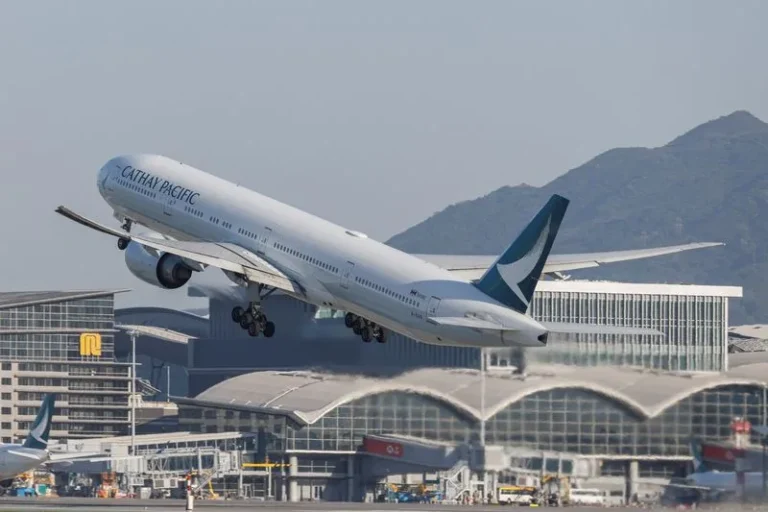Cathay Pacific Airways, Hong Kong’s flagship airline, has warned of falling airfares and an uncertain cargo market, sending its shares down more than 10%. This came shortly after the company reported a slight increase in its first-half profit.
The airline posted a 1% rise in profit to HK$3.65 billion (US$465 million) for the first half of the year. The profit increase was supported by strong passenger traffic, lower fuel prices, and steady cargo activity. However, the drop in passenger yields raised concerns among investors.
Airfares, measured by passenger yield, declined by 12.3% for Cathay’s main brand and 21.6% for its low-cost airline HK Express. This drop came as Cathay and other airlines expanded their capacity, leading to stiffer competition across the region.
Cathay Chairman Patrick Healy said that HK Express continues to face short-term difficulties. The budget airline reported a first-half loss of HK$524 million before net finance charges and tax. Despite the losses, Healy said the company remains focused on a long-term plan and expects HK Express to return to profit in the future.
Cathay’s shares dropped by as much as 10.7% following the results announcement, reaching the lowest level since early July 2025. This marked the biggest single-day percentage drop in its shares since November 2008. Meanwhile, the Hang Seng Index, which tracks Hong Kong’s major companies, rose slightly by 0.2%.
Market experts noted that while Cathay’s overall results were in line with expectations, the weak performance of the budget airline was a negative surprise for investors. Airlines across Asia are experiencing lower ticket prices after hitting post-pandemic highs. This is because more airlines are adding flights, increasing competition and reducing prices.
In comparison, Singapore Airlines recently reported a 3.5% drop in yields for its main operations and a 4.7% drop for its budget airline Scoot during the April to June quarter. Asia’s air travel industry has taken longer to recover after COVID-19 due to slower reopening in countries like China and regions such as Hong Kong.
Cathay is also a major player in cargo transport. The airline operates from the world’s busiest cargo airport and has gained from the rise in e-commerce shipping from China in recent years. But the company warned of new cargo risks linked to U.S. tariff changes.
In particular, the cancellation of a duty-free rule for low-value shipments from China and Hong Kong in early May has added pressure on the cargo business. Despite this, Cathay said its cargo arm remained strong. The company is now shifting its cargo flights to other regions where demand is still solid.
The cargo division’s revenue rose by 2.2% in the first half to HK$11.1 billion, although yields fell 3.4% over the same period.
As part of its long-term fleet renewal, Cathay Pacific confirmed it has ordered 14 more Boeing 777-9 wide-body jets. This brings its total order for the aircraft to 35, with options to buy seven more in the future. The list price for the new jets is US$8.1 billion, though Cathay said it received substantial discounts as is common in major airline deals.
The Boeing 777-9 is the newest model in Boeing’s 777 series but has faced delays. It has yet to be certified by the U.S. Federal Aviation Administration. Boeing has stated that flight testing is ongoing, and it hopes to begin deliveries in 2026. Cathay said it expects to receive its first 777-9 aircraft in early 2027, with the full delivery expected by 2034.
Despite short-term challenges in airfares and cargo, Cathay continues to invest in its future, focusing on growth, fleet modernization, and long-term profitability.







